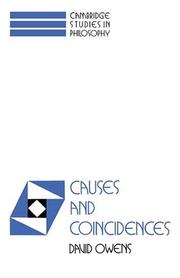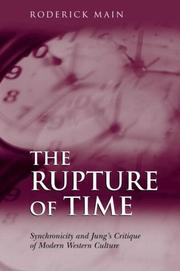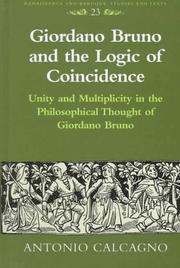| Listing 1 - 9 of 9 |
Sort by
|
Book
ISBN: 9780674425415 0674425413 9780674967649 067496764X 067442543X Year: 2015 Publisher: Cambridge, Massachusetts
Abstract | Keywords | Export | Availability | Bookmark
 Loading...
Loading...Choose an application
- Reference Manager
- EndNote
- RefWorks (Direct export to RefWorks)
Anders Engberg-Pedersen shows how the Napoleonic Wars inspired a new discourse on knowledge in the West. Soldiers returning from battle were forced to reconsider what it is possible to know and how decisions are made in a fog of imperfect knowledge. Chance no longer appeared exceptional but normative—a prism for understanding the modern world.
Napoleonic Wars, 1800-1815. --- Chance. --- Coincidence. --- Military art and science --- Simultaneousness --- Synchronicity --- Synchronism --- Chance --- Simultaneity (Physics) --- Fortune --- Necessity (Philosophy) --- Probabilities --- Napoleonic Wars, 1800-1814 --- History --- Europe

ISBN: 0521416507 0521044480 0511520069 Year: 1992 Volume: vol *14 Publisher: Cambridge Cambridge University press
Abstract | Keywords | Export | Availability | Bookmark
 Loading...
Loading...Choose an application
- Reference Manager
- EndNote
- RefWorks (Direct export to RefWorks)
In an important departure from theories of causation, David Owens proposes that coincidences have no causes, and that a cause is something which ensures that its effects are no coincidence. In Causes and Coincidences, he elucidates the idea of a coincidence as an event which can be analysed into constituent events, the nomological antecedents of which are independent of each other. He also suggests that causal facts can be analysed in terms of non-causal facts, including relations of necessity. Thus, causation is defined in terms of coincidence, and coincidence without reference to causation. David Owens challenges the ideas associated with Hume, Davidson and Lewis, constructing a theory which distinguishes nomological necessity and sufficiency from their logical counterparts. He is able to offer novel solutions to the major problems of causation, including the direction of causation, the logical form of causal statements, the distinction betwen causal connections and logical connections, and the relationship between psychological and physical causation.
Causaliteit --- Causalité --- Causation --- Coincidence --- Gelijktijdigheid --- Oorzakelijkheid --- Simultanéité --- Coïncidence --- Simultaneousness --- Synchronicity --- Synchronism --- Chance --- Simultaneity (Physics) --- Causality --- Cause and effect --- Effect and cause --- Final cause --- Beginning --- God --- Metaphysics --- Philosophy --- Necessity (Philosophy) --- Teleology --- Causation. --- Coincidence. --- Causalité --- Coïncidence --- Arts and Humanities
Book
ISBN: 3458160841 Year: 1989 Publisher: Frankfurt a.M. Insel Verlag
Abstract | Keywords | Export | Availability | Bookmark
 Loading...
Loading...Choose an application
- Reference Manager
- EndNote
- RefWorks (Direct export to RefWorks)
Coincidence --- -Harmony (Aesthetics) --- -Harmony (Aesthetics) in literature --- -Harmony (Aesthetics) as a theme in literature --- Aesthetics --- Simultaneousness --- Synchronicity --- Synchronism --- Chance --- Simultaneity (Physics) --- Congresses --- Conferences - Meetings --- Harmony (Aesthetics) in literature --- Harmony (Aesthetics) --- Harmony (Aesthetics) as a theme in literature
Book
ISBN: 3658142278 3658142286 Year: 2016 Publisher: Wiesbaden : Springer Fachmedien Wiesbaden : Imprint: Springer,
Abstract | Keywords | Export | Availability | Bookmark
 Loading...
Loading...Choose an application
- Reference Manager
- EndNote
- RefWorks (Direct export to RefWorks)
Morten Frederiksen explores Carl Gustav Jung’s elusive notion of synchronicity from a transrational perspective and relates synchronicity to the transpersonality of the "All-One". This is done by expanding the content and meaning of Wolfgang Dietrich´s layers of Elicitive Conflict Mapping (ECM) through re-relating them to Ken Wilber´s model of the structures of consciousness; with synchronicity as the literal connecting principle. The result, then, is an expanded notion of the transrational peace philosophy which includes Wilber´s model of stages shorn of its evolutionary slant and fathoms synchronicity in its theoretical outlook and practical application. Contents A Transrational Approach to Peace Studies through processing the Topic of Synchronicity Jungian Psychology and his Concept of Synchronicity Transrational Peace Philosophy and Consciousness Development Seven different Structures of Consciousness Consequences of Synchronicity for a transrational-oriented Peace Philosophy and Practice Target Groups Lecturers and Students of Psychology, Peace Students and Conflict Transformation Researchers Practitioners in the Field of Elicitive Conflict Transformation About the Author Morten Frederiksen is a Peace Researcher from the MA Program in Peace, Security, Development and International Conflict Transformation at the University of Innsbruck, Austria, and Coordinator of the Danish Development Aid Agency "U-landsforeningen Svalerne".
Psychology. --- Developmental psychology. --- Supervision. --- Counseling. --- Developmental Psychology. --- Consulting - Supervision - Coaching. --- Coincidence. --- Simultaneousness --- Synchronicity --- Synchronism --- Consulting, Supervision and Coaching. --- Development (Psychology) --- Developmental psychobiology --- Psychology --- Life cycle, Human --- Chance --- Simultaneity (Physics) --- Counselling --- Helping behavior --- Psychology, Applied --- Clinical sociology --- Interviewing --- Personal coaching --- Social case work --- Supervisory relationships --- Management

ISBN: 1583912282 0203501462 9780203501467 9781135453121 1135453128 1138011924 1280078677 9781135453084 9781135453138 9781583912287 9781138011922 9781280078675 Year: 2004 Publisher: Hove New York Brunner-Routledge
Abstract | Keywords | Export | Availability | Bookmark
 Loading...
Loading...Choose an application
- Reference Manager
- EndNote
- RefWorks (Direct export to RefWorks)
Why was the idea of synchronicity so important to Jung?Jung's theory of synchronicity radically challenges the entrenched assumptions of mainstream modern culture in the West. It is one of the most fascinating yet difficult and discomfiting of Jung's psychological theories.The Rupture of Time aims to clarify what Jung really meant by synchronicity, why the idea was so important to him and how it informed his thinking about modern western culture. Areas examined include:* how the theory fits into Jung's overall psychological model and the significance of its apparen
Civilization [Modern ] --- Psychological aspects --- Coincidence. --- Psychoanalysis and culture. --- Civilization, Modern --- Culture and psychoanalysis --- Culture --- Simultaneousness --- Synchronicity --- Synchronism --- Chance --- Simultaneity (Physics) --- Psychological aspects. --- Jung, C. G. --- Jung, Carl Gustav --- Jung, Karl Gustav, --- I︠U︡nh, Karl Hustav, --- Jung, Carl Gustav, --- Yung, Ḳ. G. --- Yungu, C. G. --- I︠U︡ng, Karl Gustav, --- יונג, קרל גוסטאב --- יונג, קרל גוסטב --- יונג, ק. ג. --- 榮格, --- C. G. ユング, --- Yūng, Kārl Gustāv, --- يونگ، کارل گستاو

ISBN: 0820438693 Year: 1998 Volume: 23. Publisher: New York (N.Y.): Lang
Abstract | Keywords | Export | Availability | Bookmark
 Loading...
Loading...Choose an application
- Reference Manager
- EndNote
- RefWorks (Direct export to RefWorks)
Whole and parts (Philosophy) --- Coincidence --- Philosophy, Italian --- Philosophy, Renaissance --- Tout et parties (Philosophie) --- Coïncidence --- Philosophie italienne --- Philosophie de la Renaissance --- History --- Histoire --- Bruno, Giordano, --- Ganzheit (Philosophy) --- Mereology --- Totality (Philosophy) --- Unity (Philosophy) --- Wholeness --- Categories (Philosophy) --- Simultaneousness --- Synchronicity --- Synchronism --- Chance --- Simultaneity (Physics) --- Bruno, Giordano --- Coïncidence --- Giordano, Bruno --- Brono, G'yordano, --- Brouno, Tziorntano, --- Bruno, Dzhordano, --- Bruno, Filippo, --- Bruno, G'yordano, --- Brunus Nolanus, Jordanus, --- Bulunuo, --- Nolanus, Jordanus Brunus, --- Bruno, --- Pu-lu-no, --- Pu-lu-no, Chʻiao-erh-tan-no, --- ברונו, ג׳ורדאנו, --- ברונו, ג׳ורדנו --- ברונו, ג׳יורדנו
Book
ISBN: 9024275830 Year: 1988 Publisher: Kampen Kok Agora
Abstract | Keywords | Export | Availability | Bookmark
 Loading...
Loading...Choose an application
- Reference Manager
- EndNote
- RefWorks (Direct export to RefWorks)
Philosophy of nature --- Natural theology --- Einstein, Albert --- Jung, Carl Gustav --- Cosmology --- -Relativity (Physics) --- -Coincidence --- -God --- -#GBIB:SMM --- #GSDBP --- Metaphysics --- Misotheism --- Monotheism --- Religion --- Theism --- Simultaneousness --- Synchronicity --- Synchronism --- Chance --- Simultaneity (Physics) --- Astronomy --- Deism --- History --- History of doctrines --- Jung, Carl Gustav. --- Jung, C. G. --- Coincidence --- God --- Relativity (Physics) --- #GBIB:SMM --- Einstein, Albert, --- Jung, Karl Gustav, --- I︠U︡nh, Karl Hustav, --- Jung, Carl Gustav, --- Yung, Ḳ. G. --- Yungu, C. G. --- I︠U︡ng, Karl Gustav, --- יונג, קרל גוסטאב --- יונג, קרל גוסטב --- יונג, ק. ג. --- 榮格, --- C. G. ユング, --- Yūng, Kārl Gustāv, --- يونگ، کارل گستاو --- Aiyinsitan, Abote, --- Aĭnshtaĭn, Albert, --- Ainshutain, A, --- Ain̲sṭain̲, Ālparṭ, --- Ainsṭāina, Albarṭa, --- Ajnštajn, Albert, --- Āynishtayn, --- Aynshtayn, Albert, --- Eĭnshteĭn, Alʹbert, --- אינשטין, אלברט, --- איינשטיין --- איינשטיין, אלבערט, --- איינשטיין, אלברט --- איינשטיין, אלברט, --- Aynştayn, Elbêrt, --- Īnshtīn, --- Aynîştayn, --- Aiyinsitan, --- 愛因斯坦, --- 爱因斯坦,
Book
ISBN: 3892061521 9783892061526 Year: 1986 Publisher: Essen Blaue Eule
Abstract | Keywords | Export | Availability | Bookmark
 Loading...
Loading...Choose an application
- Reference Manager
- EndNote
- RefWorks (Direct export to RefWorks)
Identity (Philosophical concept) --- Coincidence --- Heidegger, Martin, --- Jung, Carl Gustav, --- Identity --- Simultaneousness --- Synchronicity --- Synchronism --- Chance --- Simultaneity (Physics) --- Philosophy --- Comparison (Philosophy) --- Resemblance (Philosophy) --- Heidegger, Martin --- Jung, Carl Gustav. --- Jung, C. G. --- Jung, Karl Gustav, --- I︠U︡nh, Karl Hustav, --- Yung, Ḳ. G. --- Yungu, C. G. --- I︠U︡ng, Karl Gustav, --- יונג, קרל גוסטאב --- יונג, קרל גוסטב --- יונג, ק. ג. --- 榮格, --- C. G. ユング, --- Yūng, Kārl Gustāv, --- يونگ، کارل گستاو --- Khaĭdegger, Martin, --- Haĭdegger, Martin, --- Hīdajar, Mārtin, --- Hai-te-ko, --- Haidegŏ, --- Chaitenger, Martinos, --- Chaitenker, Martinos, --- Chaintenger, Martin, --- Khaĭdeger, Martin, --- Hai-te-ko-erh, --- Haideger, Marṭinn, --- Heidegger, M. --- Haideger, Martin, --- Hajdeger, Martin, --- הייגדר, מרתין --- היידגר, מרטין --- היידגר, מרטין, --- 海德格尔, --- Chaintenker, Martin, --- Hāydigir, Mārtīn, --- Hīdigir, Mārtīn, --- هاىدگر, مارتين, --- هىدگر, مارتين, --- Jung, Carl Gustav --- Heidegger, Martin, - 1889-1976 --- Jung, Carl Gustav, - 1875-1961
Book
ISBN: 1283142368 144382786X 9786613142368 9781443827867 9781283142366 1443827061 9781443827065 Year: 2011 Publisher: Newcastle upon Tyne : Cambridge Scholars Pub.,
Abstract | Keywords | Export | Availability | Bookmark
 Loading...
Loading...Choose an application
- Reference Manager
- EndNote
- RefWorks (Direct export to RefWorks)
Jung's understanding of Yijing for supporting the synchronistic principle reveals the key issues of his archetypal theory. Jung's archetypal theory, which is the basic motif of his understanding of Yijing, illuminates the religious significance of Yijing. Jung defines the human experience of the divine as an archetypal process by way of which the unconscious conveys the human religious experience. In this way, the divine and the unconscious mind are inseparable from each other. For the human ...
Coincidence. --- Simultaneousness --- Synchronicity --- Synchronism --- Chance --- Simultaneity (Physics) --- Jung, C. G. --- Jung, Karl Gustav, --- I︠U︡nh, Karl Hustav, --- Jung, Carl Gustav, --- Yung, Ḳ. G. --- Yungu, C. G. --- I︠U︡ng, Karl Gustav, --- יונג, קרל גוסטאב --- יונג, קרל גוסטב --- יונג, ק. ג. --- 榮格, --- C. G. ユング, --- Yūng, Kārl Gustāv, --- يونگ، کارل گستاو --- Yi jing. --- I ching --- I Ging --- Yih-king --- Y-king --- Book of changes --- Yi-king --- Yh-king --- J King --- Kniga peremen --- It︠s︡zin --- Zhou yi --- Ekikyō --- Chuyŏk --- Yŏkkyŏng --- I-Tjing --- Shūeki --- I tsʻing --- Sefer ha-temurot --- Kinh dịch --- Chou yi --- Zhouyi --- Zhou yi Wang Han zhu --- Zhou yi zhu --- Zhou yi Wang zhu --- Classic of changes --- Jung, Carl Gustav --- Yijing --- 易经 --- 易經
| Listing 1 - 9 of 9 |
Sort by
|

 Search
Search Feedback
Feedback About UniCat
About UniCat  Help
Help News
News